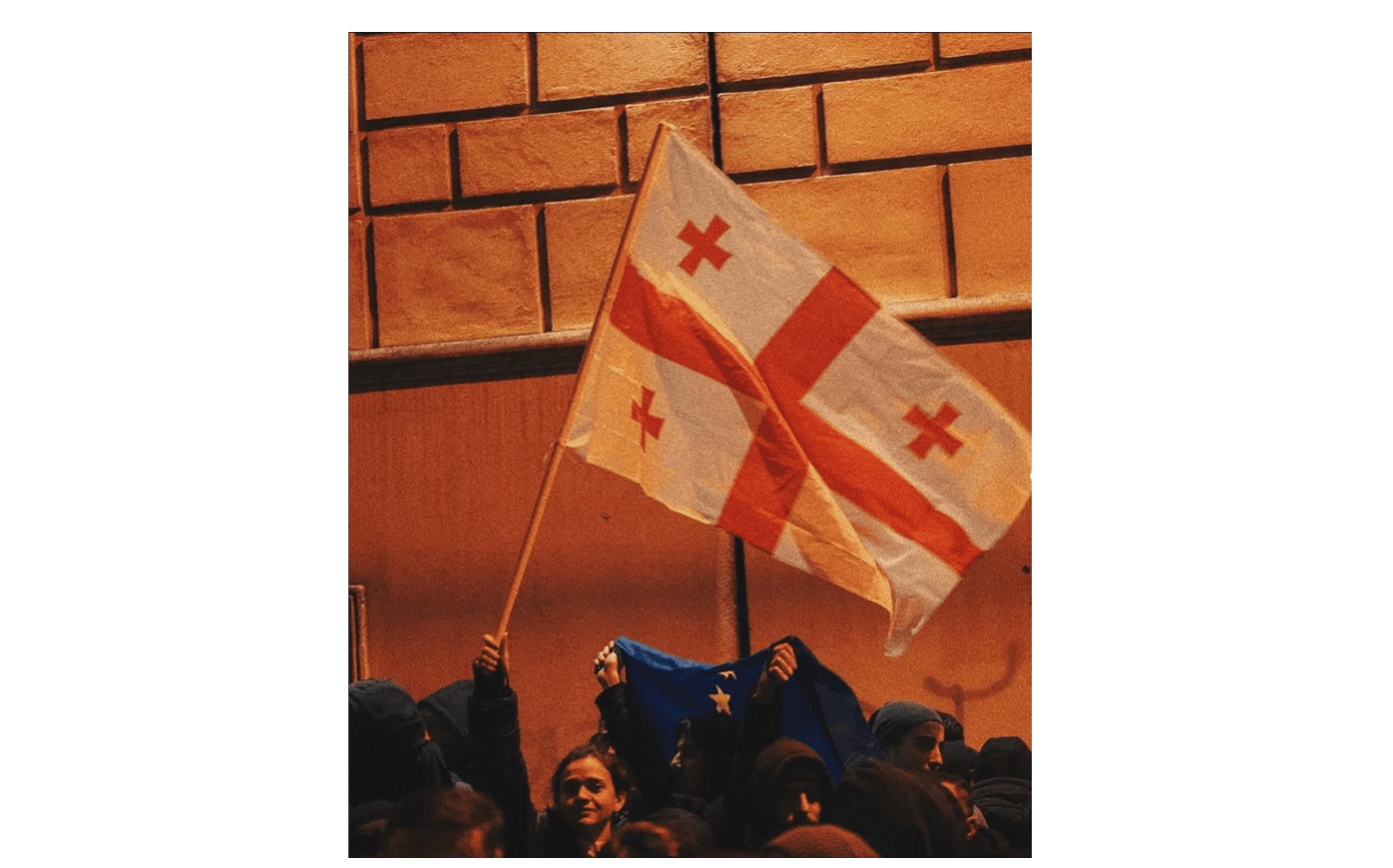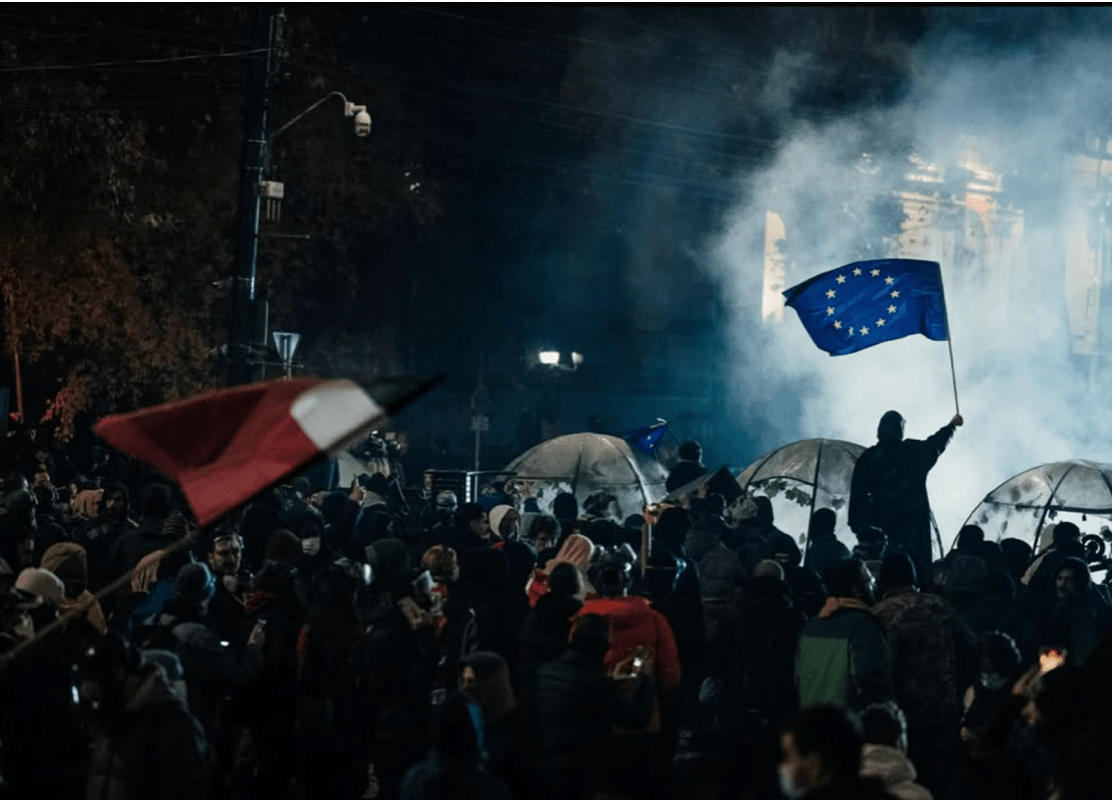Georgians Are Holding the Line. Is Help Coming?
Recent Articles
Author: Nino Lezhava
12/19/2024
In a historic first, civil servants and diplomats from Georgia have joined the country’s massive street protests, risking their careers in what they see as a fight to defend the country’s constitution. Professionals from IT specialists to doctors have rallied together, united by a shared commitment to democracy. Among the throngs stands a young woman who lost an eye to rubber bullets during the 2019 protests, now marching alongside the former Minister of Internal Affairs—once her adversary, now an opposition leader.
With week after week of unrelenting protests, the streets of Georgia are the battleground for a broad-based fight for democracy. What began as outrage over perceptions of a stolen parliamentary election, followed by the government’s abrupt suspension of EU accession talks, has evolved into a seismic national movement against the country’s ruling Georgia Dream party. Peaceful demonstrators have faced violent crackdowns: over 350 people have been jailed, while journalists have been beaten and intimidated. Despite the repression, the crowds on Rustaveli Avenue in the capital, Tbilisi, continue to swell, their resolve hardening with each confrontation.
 Photo: Dato Koridze
Photo: Dato Koridze
Beneath the turmoil lies a powerful undercurrent: a nation striving to cast off the last vestiges of Soviet-era influence. This rebirth of civic identity and unity has invigorated Georgian society, yet it poses an urgent question: how will this momentum be channeled? For now, the opposition remains fragmented and lacks a cohesive strategy, leaving the protesters without the institutional leadership needed to translate resistance into systemic reform.
Meanwhile, the government has doubled down. Threats of mass reorganization and purges loom over civil servants, while new legal amendments expand police powers and impose harsher penalties on protesters. These measures, coupled with a deliberate suppression of dissent, signal what is perceived by many in the streets as a troubling drift toward authoritarianism — the so-called “Belarusization” of Georgia’s political system.
Two Presidents
In a desperate bid to consolidate power, the Georgian government orchestrated a controversial presidential election on December 14. The goal? To remove President Salome Zurabichvili, Georgia’s Commander-in-Chief and a rare pro-Western voice of legitimacy, who has openly supported the protests and sought support from the international community.
Bidzina Ivanishvili, the billionaire oligarch widely regarded as Georgia’s shadow ruler, handpicked former footballer Mikheil Kavelashvili—a far-right, anti-Western figure with no higher education or political experience—as the sole candidate in an election controlled by the ruling Georgian Dream party. Kavelashvili’s unopposed candidacy was seen as an affront to democratic norms, as protesters defiantly gathered outside Parliament to play football, symbolizing their disillusionment with a government that treats democracy as a game.
Georgia, once hailed as a beacon of democracy in the region, now finds itself aligned with authoritarian regimes. Republican Congressman Joe Wilson, chair of the U.S. Helsinki Commission, condemned the election, reaffirming Zurabichvili as Georgia’s only legitimate president and calling for new parliamentary elections. The European leaders have echoed this stance, further isolating the Georgian government on the global stage.
Inauguration of Kavelashvili is planned for December 29, while Salome Zurabichvili does not plan to leave the position or the palace: "I am here, and I will stay here," said the fifth President of Georgia, calling Kavelashvili as the sixth President a "provocation" and a "parody."
Is Help Coming?
For Georgian protesters, waving EU flags outside government offices has become an act of defiance against what they perceive as an increasingly autocratic state. Yet, they know that symbolic gestures alone will not suffice. Their struggle requires tangible support from international partners who have often celebrated Georgian democracy in the post-Soviet space. The timing for such support could not be more critical or opportune.
 Photo: Tako Robakidze
Photo: Tako Robakidze
Russia's full-scale invasion of Ukraine has laid bare the Kremlin's vulnerabilities, both at home and abroad. Nearly three years of grinding conflict have inflicted staggering losses—over 600,000 casualties by some estimates—and eroded Moscow's once-dominant influence in its so-called "near abroad." The implications for Georgia are profound. For years, Moscow relied on its coercive power and propaganda networks to subdue dissent in its neighborhood, but its current weaknesses offer the West a rare window of opportunity. This decline offers the West an opening to counteract authoritarian backsliding in Georgia and bolster pro-democracy movements in the region.
The responses from Georgia's allies, however, have been uneven. The United States has imposed limited sanctions, targeting 20 individuals accused of undermining democracy. This followed the US suspension of its strategic partnership with Georgian on November 30. Meanwhile, the Georgian Dream holds high expectations for U.S. President-elect Donald Trump, anticipating a shift in attitude toward Georgia that would favor their government more than the Biden administration's approach. Meanwhile, the United States could impose more robust sanctions on the oligarch, who serves as the center of gravity for the Georgian Dream government, thereby effectively influencing the process in favor of the democratic struggle.
The same applies to the EU—Brussels must act more decisively. While individual EU member states, particularly the Baltic States, have taken a clear stance, the EU as a whole remains divided, hampered by internal politics and Hungary's threat to veto stronger measures. The newly appointed EU Foreign Policy Chief, Kaja Kallas, has voiced support for Georgian protesters. However, the EU Foreign Affairs Council's decision to suspend visa-free travel for Georgian officials holding diplomatic passports, while damaging to the government's image and comfort, does not inflict substantial harm on their maneuverability or operational capacity. “Europe has so far only met the challenge halfway. It has been slow to wake up and slow to react. Much more could and should be done,” Stated the President of Georgia during her speech at the European Parliament in Strasbourg today.
Brussels and Washington must recognize that Georgia is more than a battleground for its citizens' aspirations—it is a test of Western resolve to counter authoritarianism at the heart of what the Kremlin considers its strategic neighborhood. The resilience of Georgian protesters stands as a signal of democratic potential, one that the West cannot afford to ignore. Failing to act decisively now risks allowing the subjugation of Georgia to Russia to become permanent, while handing a symbolic victory to Moscow at a time when its influence is waning.
The struggle in Georgia is not just about the future of one small nation; it is about setting a precedent in a region where democratic gains are fragile. Supporting Georgia now, as it resists both internal repression and external authoritarian influence, is an investment in the principles the West claims to champion. For the United States and the EU, the stakes are clear: this is an opportunity to show that their commitment to democracy is more than rhetoric. As former U.S. President Ronald Reagan said, “Every lesson of history tells that the greater risk lies in appeasement, and this is the specter well-meaning liberal friends refuse to face, that their policy of accommodation is appeasement, and it gives no choice between peace and war, only between fight or surrender. If we continue to accommodate, continue to fall back and retreat, eventually, we have to face the final demand, the ultimatum.”
AUTHOR’S BIO: Nino Lezhava
Nino Lezhava is a research analyst based in Georgia. She focuses on the security and democratic developments of the wider Black Sea region, including the South Caucasus. She specializes in geopolitical competition, Euro-Atlantic relations, and hybrid warfare.
Ms. Lezhava holds two master’s degrees: one in International and European Security from Geneva University and another in Public Administration from the German University of Administrative Sciences in Speyer. She lectures at German and Georgian universities, contributes her expertise as a parliamentary researcher in Georgia, and is a freelance contributor for various media outlets